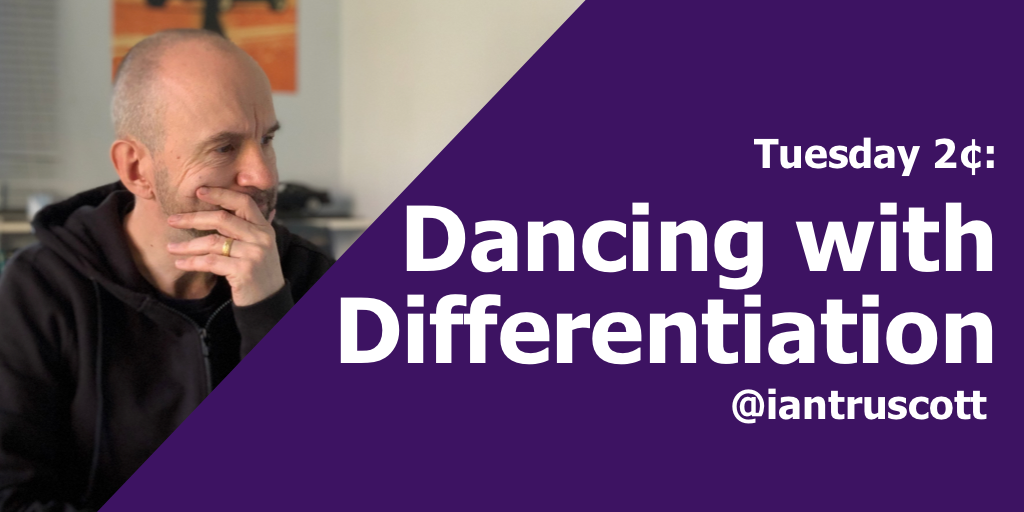Being different, differentiated, a purple cow, that’s what we are all here for, but it’s a dance, or a Monty Python sketch or from Star Wars…
In the B2B marketing playbook, or maybe any marketing playbook, the podcast playbook, the personal branding playbook, and any advice you get on marketing or promotion, the first lesson is to be different.
Be differentiated, stand out from the crowd and be, as Seth Godin describes, a purple cow.
In B2B technology, this isn’t just about how you position your company, service or product; you must redefine the category you are in and change the game. When I started in pre-sales, with a firm grip on my solution selling handbook, you needed to “re-engineer the buyer’s vision” (through a 9-block model no-less!)
We giggle that there seems to be a collusion between industry analysts, commentators and vendor marketing to create yet another TLA. An acronym or catchy category niche, that is a hill an analyst can claim to be the expert on, creating a place for themselves in their firm, and the vendor can dominate and trumpet that they are “the leading vendor of…”
I jest. Making a brand different and memorable is what we are all here for.
BTW – over a decade ago, one of my marketing mentors Robert Rose, recommended Youngme Moon’s Different as I went through my marketing education – great book. Also, on the topic of disrupting or redefining categories, give Play Bigger a go.
But… it’s a dance.
Too different and the buyer doesn’t know who you are
How often have you heard, “oh you are the this for this” as they try and place you in their mental map of whatever industry you are in? People like pattern matching.
I was talking to a vendor the other day who, it seems to me is in a genuinely new category of optimising revenue for SaaS solutions. I asked an industry chum to take a look, someone who could be the target audience, and they reviewed their website and said, “it seems like a PLG led CRM category”.
Aside from being a great example of our obsession with TLA’s, my chum was putting the vendor into a context they understood – Product Led Growth and Customer Relationship Management.
This description didn’t quite hit the mark when I fed this back to the vendor’s founder, but they found this useful and said that they needed to work on contextualising their messaging.
Whereas I have experienced other founders who say proudly, “no, we are unique”, and resist this. Which doesn’t help the buyer. Pissed off that another vendor just ripped off your unique messaging? Don’t be, you are creating a category, a market, a place for a buyer to find you.
A market needs other market stalls, or you are just a fruit stand by the side of the road hoping for passing traffic.
Too the same, and the buyer smells bullshit
Sometimes when you hear a vendor describe their super niche that sounds just like something else, it sounds to me like that classic quote from Monty Python’s Life of Brian (which, trust me kids, is even a tad before my time)
“The Judean People’s Front? F**k off… we’re the People’s Front of Judea!”
“Digital Asset Management? F**k off… we’re Marketing Asset Management!”
Not sure anyone ever said that, and apologies if you think there is a difference but these semantic arguments are jolly fun for us in the goldfish bowl of these categories, but to a buyer, it just sounds daft.
We marketers have enough of a credibility problem, and buyers are cynical of our salespeople, who they believe are trying to pull a Jedi mind trick without us saying, “these practically identical robots are not like the ones you thought you were looking for”.
Or, err…. something like that. Sorry Star Wars fans.
Different where it matters to them
As with any marketing, some insight into the buyer is super helpful here.
What could be different about you that the buyer could care about? And can you claim and defend that? Does this differentiation help you find your kind of people?
The recent campaign by Apple as a champion of privacy is a great example, as a proprietary platform all locked down, the perceived weakness against the more open Android platform is a strength. Can Google credibly make the same claim? Maybe both of these mobile platforms have freely helped themselves to our data, but it’s really hard to associate Google with privacy.
And that leads to turning a weakness into a brand attribute strength, but that’s for another day, and this is post is supposed to be 2 cents, and I am running on a bit.
Differentiation, it’s a dance…
Fancy more of this?
Subscribe to my Rockstar CMO Newsletter

I’m a 3xCMO, now a marketing strategy advisor and podcast host at Rockstar CMO. Although, I’m not a rock star, but a marketing leader, strategist, content marketer, columnist, speaker, industry watcher, and creator of ART (Awareness, Revenue, and Trust) for the companies I work with. But most of all, I am an enthusiastic tea drinker.
You can find me on LinkedIn, Twitter, or now Threads! – or listen to my weekly podcast at Rockstarcmo.com
The half-baked thoughts shared on this blog may not reflect those of my employer or clients, and if the topic of this article is interesting or you just want to say hello please get in touch.
